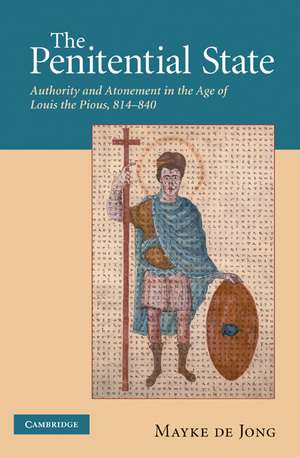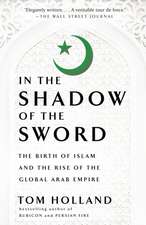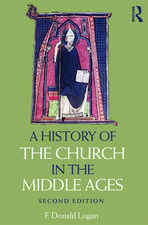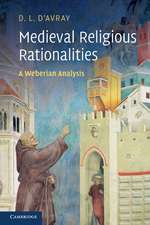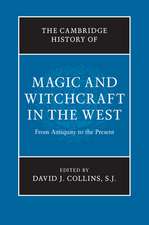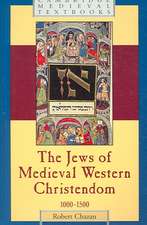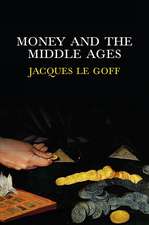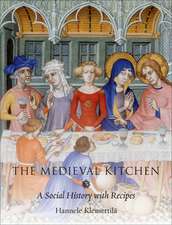The Penitential State: Authority and Atonement in the Age of Louis the Pious, 814–840
Autor Mayke de de Jongen Limba Engleză Paperback – 27 apr 2011
Toate formatele și edițiile
| Toate formatele și edițiile | Preț | Express |
|---|---|---|
| Paperback (1) | 327.41 lei 6-8 săpt. | |
| Cambridge University Press – 27 apr 2011 | 327.41 lei 6-8 săpt. | |
| Hardback (1) | 700.20 lei 6-8 săpt. | |
| Cambridge University Press – 15 apr 2009 | 700.20 lei 6-8 săpt. |
Preț: 327.41 lei
Nou
Puncte Express: 491
Preț estimativ în valută:
62.67€ • 68.10$ • 52.68£
62.67€ • 68.10$ • 52.68£
Carte tipărită la comandă
Livrare economică 21 aprilie-05 mai
Preluare comenzi: 021 569.72.76
Specificații
ISBN-13: 9780521205207
ISBN-10: 0521205204
Pagini: 340
Ilustrații: black & white illustrations
Dimensiuni: 153 x 229 x 20 mm
Greutate: 0.5 kg
Editura: Cambridge University Press
Colecția Cambridge University Press
Locul publicării:Cambridge, United Kingdom
ISBN-10: 0521205204
Pagini: 340
Ilustrații: black & white illustrations
Dimensiuni: 153 x 229 x 20 mm
Greutate: 0.5 kg
Editura: Cambridge University Press
Colecția Cambridge University Press
Locul publicării:Cambridge, United Kingdom
Cuprins
Introduction: the penitential state; 1. Louis the Pious (778–840); 2. Ninth-century narratives; 3. Admonitio, correptio, increpatio; 4. The wages of sin (828–829); 5. Purity and danger (830–831); 6. Scandal and satisfaction (832–834); Epilogue: the penitential state after Louis the Pious.
Recenzii
'… a profound explication of Carolingian political ideals and practices as they unfolded primarily between 822 and 840 … [de Jong] has blended the delight in evoking historical contingency with her trademark command of Carolingian (religious) culture … Although this incisive book was penned with specialists in mind … it has much broader implications.' Hans Hummer, Speculum
'[De Jong] forces readers to reconsider not only Louis's supposed weakness but also the putative villainy, weakly disguised as piety, of those who challenged him. De Jong achieves all of this in a book fully suitable for undergraduates. Summing up: highly recommended.' C. J. Chandler, Choice
'… meticulously researched … important and thoughtful … De Jong opens with a long chapter that stands as the best account of Louis's reign now available … Her deep understanding of this culture superbly contextualizes the discordant and anguished voices of 833.' John J. Contreni, The American Historical Review
'… an important and subtle examination of the reign [of Louis the Pious] … a deft and original evocation of this world of open criticism … any reassessment [of his reign] will have to be worked out within the new interpretive framework for the sources staked out in de Jong's outstanding book.' Simon MacLean, Journal of Ecclesiastical History
'… an extremely sensitive analysis of the great wealth of narrative and other sources … This is, in other words, a book at the heart of an unfolding historiographical movement, much of it inspired in part or whole by de Jong's earlier path-breaking work in the field. It is clearly, too, a study which will greatly influence the development of that field … One finishes this accessible and enlightening book wanting more.' C. M. A. West, English Historical Review
'… fascinating … What de Jong does best is to introduce readers into the world of her authors and their audiences … Throughout, [she] makes her case by means of close, often line-by-line readings of her texts … a stimulating book to read, especially for graduate students.' Kevin Uhalde, The Medieval Review
'Both in the new avenues which it renders accessible and the clarity of the approach taken towards rhetoric, ritual and practice, de Jong's study deserves to be influential and widely read. A truly considered statement, her book is both the essential guide to Louis's troubles and a model exploration of early medieval ritual and political culture.' David Pratt, Early Medieval Europe
'[De Jong] forces readers to reconsider not only Louis's supposed weakness but also the putative villainy, weakly disguised as piety, of those who challenged him. De Jong achieves all of this in a book fully suitable for undergraduates. Summing up: highly recommended.' C. J. Chandler, Choice
'… meticulously researched … important and thoughtful … De Jong opens with a long chapter that stands as the best account of Louis's reign now available … Her deep understanding of this culture superbly contextualizes the discordant and anguished voices of 833.' John J. Contreni, The American Historical Review
'… an important and subtle examination of the reign [of Louis the Pious] … a deft and original evocation of this world of open criticism … any reassessment [of his reign] will have to be worked out within the new interpretive framework for the sources staked out in de Jong's outstanding book.' Simon MacLean, Journal of Ecclesiastical History
'… an extremely sensitive analysis of the great wealth of narrative and other sources … This is, in other words, a book at the heart of an unfolding historiographical movement, much of it inspired in part or whole by de Jong's earlier path-breaking work in the field. It is clearly, too, a study which will greatly influence the development of that field … One finishes this accessible and enlightening book wanting more.' C. M. A. West, English Historical Review
'… fascinating … What de Jong does best is to introduce readers into the world of her authors and their audiences … Throughout, [she] makes her case by means of close, often line-by-line readings of her texts … a stimulating book to read, especially for graduate students.' Kevin Uhalde, The Medieval Review
'Both in the new avenues which it renders accessible and the clarity of the approach taken towards rhetoric, ritual and practice, de Jong's study deserves to be influential and widely read. A truly considered statement, her book is both the essential guide to Louis's troubles and a model exploration of early medieval ritual and political culture.' David Pratt, Early Medieval Europe
Descriere
An evaluation of Emperor Louis the Pious' reign which examines Louis' public penance of 833.
